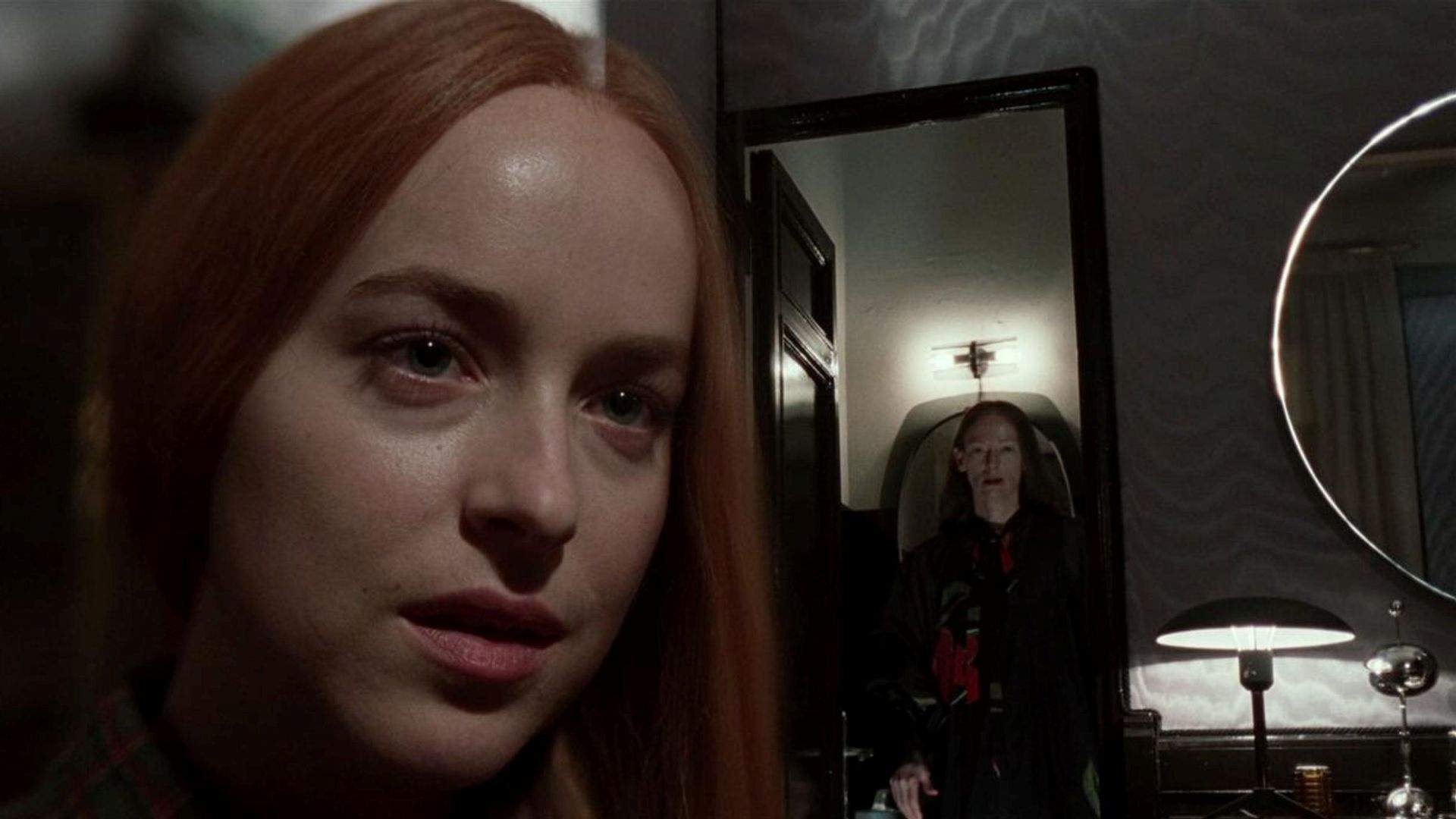Suspiria
This glorious and gory remake of the 1977 original is a twitchy, witchy delight.
Overview
Stepping into Berlin's Markos Dance Academy on a grey, rainy 1977 day, Susie Bannion (Dakota Johnson) is a picture of nervous excitement. The former Ohio Mennonite clutches at her meagre belongings with equal parts eagerness and apprehension, her eyes darting keenly. But once she's through the school's doors, she's willing to surrender to whatever comes her way. It's an attitude that everyone watching Suspiria should take note of, for Susie is the perfect viewer surrogate in this delightfully dark, seductive, twitchy and witchy remake. Like the American in Germany pursuing her dream and accepting everything that happens next, giving yourself over to the movie's horrors and charms is truly the audience's only option.
If ever a remake yearned to be judged on its own merits, it's Suspiria. After the sun-dappled Italian vistas and melancholic romance of his sublime Call Me By Your Name, filmmaker Luca Guadagnino takes Dario Argento's iconic 1977 film — and really takes to it. Made with evident love for the original, but never trying to slavishly recreate it, Guadagnino's Suspiria is a new dreamlike interpretation of an already dreamlike classic. It's the feverish nightmare you might have after letting the initial flick needle its way into your brain and mix with your own subconscious. Perhaps that's what happened to Guadagnino and his second-time screenwriter David Kajganich (A Bigger Splash). Either way, their protagonist also experiences her own disturbing nocturnal visions, and they're gloriously unhinged.
In a city still grappling with the aftermath of catastrophic conflict three decades on, where Red Army Faction terror attacks have become a daily occurrence, bad dreams are the least of Susie and her fellow dancers' concerns. Amid preparations for the academy's latest show — a re-staging of a piece created by head teacher Madame Blanc (Tilda Swinton) after the Second World War — their star goes missing. It's with an air of unease that the unsettled group moves forward after Patricia's (Chloë Grace Moretz) disappearance, which the school's teachers link to the far-left RAF's disorder in the streets. Thankfully, newcomer Susie is both willing and able to step into Patricia's shoes, with her breathy passion more than catching Madame Blanc's eye.
While Argento's Suspiria teased out its big twist, Guadagnino's version lays it all out on the dance floor from the outset. Rather than a company of dancers, complete with experienced instructors overseeing the next generation, this is a coven. Rather than training for their next recital, they're readying their new sacrifices for a ritual. Removing the mystery around the film's otherworldly elements doesn't remove the mystery from the film, however. With an elderly psychiatrist (an actor credited as 'Lutz Ebersdorf') searching for Patricia with the eventual help of Markos dancer Sara (Mia Goth), there's intrigue aplenty. The intense teacher-pupil, pseudo mother-daughter bond between Susie and Madame Blanc also keeps everyone guessing.
Scored to Thom Yorke's moody tunes and edited with a sense of anxiety, Suspiria isn't a character study. It doesn't probe the recesses of Susie's mind to explore what makes her tick, or delve deeply into Madame Blanc's motivations. Instead, it largely leaves its key duo at the mercy of the movie's macabre plot. That's what horror movies typically do, as seen in this year's other dance-horror flick, Gaspar Noe's Climax. Nonetheless, Johnson and Swinton instantly demand the audience's attention, drawing viewers in in much the same way that their characters are drawn to each other. The combination of vulnerability and determination that made Johnson the best thing about the Fifty Shades trilogy is firmly on display, as is Swinton's well-established allure in multiple guises.
Everything else that Guadagnino and Kajganich place within Suspiria's frames is also designed to reel the audience in; to encourage surrender, if not willingly then by force. A movie as densely layered as the rhythmic yet jarring dance moves that it thrusts to the fore, Suspiria is laden with intoxicating, inescapable detail. Thematically, it delves into the scars of war, the historical subjugation of women and the way that one childhood moment can shape someone's life. In its aesthetics, it's an all-out horror onslaught that evolves from creepily atmospheric to violently sensual to gleefully bloody (oh-so-bloody!) across its 152-minute running time.
The film's strong visuals shouldn't come as a surprise, although not for reasons that original Suspiria fans might expect. Where Argento's movie glowed with deep jewel tones, Guadagnino favours grim shades enlivened by more than a dash of red. With a filmography that also includes Swinton in I Am Love, and both Swinton and Johnson in A Bigger Splash, Guadagnino has long known how to throw gorgeous pictures across the screen. He's not the first filmmaker to demonstrate that horrific imagery can also be bewitching but, aided by the suitably restless camerawork of cinematographer Sayombhu Mukdeeprom (Call Me By Your Name), he makes the case in a stunning fashion. Two scenes stand out — Susie's telekinetic audition, and the movie's over-the-top climax — but the entirety of Suspiria stamps itself onto viewers' eyeballs. Perhaps Susie and her cackling company won't be the only ones having lurid, disturbing and spellbinding dreams.





